 Petzlover
Petzlover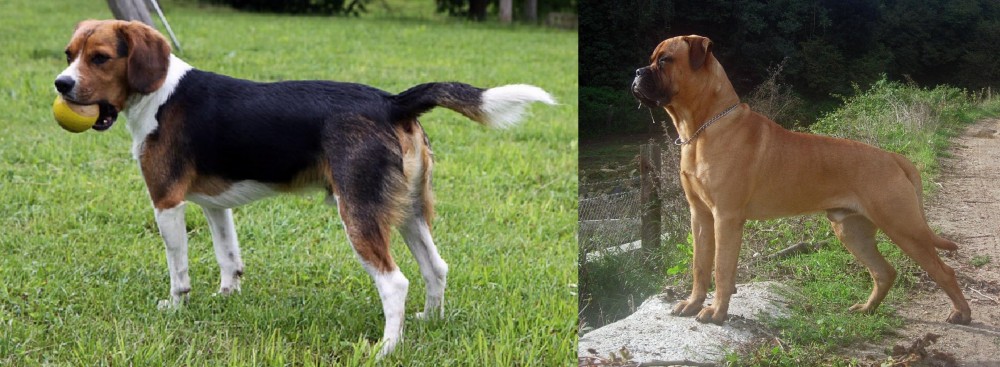 Beaglier is originated from Australia but Bullmastiff is originated from United Kingdom. Beaglier may grow 28 cm / 11 inches shorter than Bullmastiff. Beaglier may weigh 49 kg / 108 pounds lesser than Bullmastiff. Both Beaglier and Bullmastiff has almost same life span. Beaglier may have less litter size than Bullmastiff. Beaglier requires High Maintenance. But Bullmastiff requires Low Maintenance
Beaglier is originated from Australia but Bullmastiff is originated from United Kingdom. Beaglier may grow 28 cm / 11 inches shorter than Bullmastiff. Beaglier may weigh 49 kg / 108 pounds lesser than Bullmastiff. Both Beaglier and Bullmastiff has almost same life span. Beaglier may have less litter size than Bullmastiff. Beaglier requires High Maintenance. But Bullmastiff requires Low Maintenance
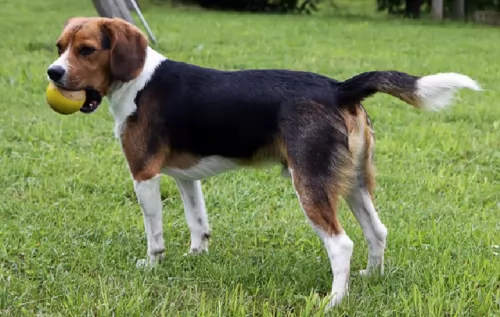 The Beaglier beginnings are set in Australia. Before around 30 years, breeders cross-breed the Beagle and the Cavalier King Charles Spaniel. The result actually turned out great – new we have a small sized breed with a wonderful, soft coat, very likeable looks, the calm and gentle dog which is very active despite his relaxed nature. They can be found around the globe nowadays and they are very popular because of their sweet nature.
The Beaglier beginnings are set in Australia. Before around 30 years, breeders cross-breed the Beagle and the Cavalier King Charles Spaniel. The result actually turned out great – new we have a small sized breed with a wonderful, soft coat, very likeable looks, the calm and gentle dog which is very active despite his relaxed nature. They can be found around the globe nowadays and they are very popular because of their sweet nature.
 The Old English Mastiff as well as the Bulldog are the breeds behind the Bull Mastiff. The Bullmastiff was originally developed in England around the 1860’s. Gamekeepers in England wanted a large, brave, robust dog which could help with keeping poachers away from their large estates which kept game.
The Old English Mastiff as well as the Bulldog are the breeds behind the Bull Mastiff. The Bullmastiff was originally developed in England around the 1860’s. Gamekeepers in England wanted a large, brave, robust dog which could help with keeping poachers away from their large estates which kept game.
As these large estates dwindled, so did the need for the services of the Bullmastiff and later they were simply bred to be family companions. As more Old English Mastiffs were bred, the dog became lighter, so that light tan or fawn became the preferred color.
The breed was officially recognized by the English Kennel Club in 1924, and the American Kennel Club in 1933.
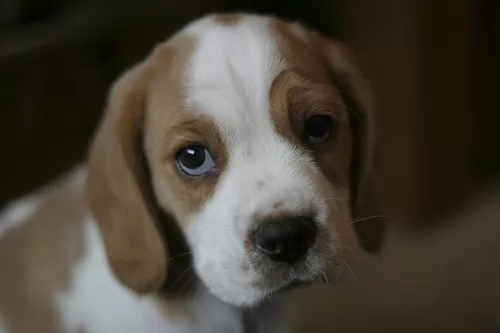 This small dog breed, called Beaglier and Beagler, has the look of his parents. Sometimes, they look more like the Spaniel, and sometimes they look more like the Beagle. This actually means that they are usually small, but can be, in some cases, even medium sized dog. They are usually tricoloured and in most cases, they have dark brown and cream hairs with white markings. They have longer ears, sometimes with more hairs if they look more like the Spaniel. They have large, dark brown eyes and usually dark nose. This breed is very loving and affectionate. They have a high need for a daily activity and they are the best choice for families with children.
This small dog breed, called Beaglier and Beagler, has the look of his parents. Sometimes, they look more like the Spaniel, and sometimes they look more like the Beagle. This actually means that they are usually small, but can be, in some cases, even medium sized dog. They are usually tricoloured and in most cases, they have dark brown and cream hairs with white markings. They have longer ears, sometimes with more hairs if they look more like the Spaniel. They have large, dark brown eyes and usually dark nose. This breed is very loving and affectionate. They have a high need for a daily activity and they are the best choice for families with children.
 Bullmastiffs are large, brachycephalic dogs, and heights are between 61 and 68cm and the dog weight anything between 41 – 59kg. While it isn’t particularly tall, the dog is thickly set with a deep chest and strong, muscular legs. The Bull Mastiff has a powerful build and plenty of strength with an imposing look on his face. He is a powerful, active breed with a short coat which is also weather resistant and can be any shade of fawn, red or brindle.
Bullmastiffs are large, brachycephalic dogs, and heights are between 61 and 68cm and the dog weight anything between 41 – 59kg. While it isn’t particularly tall, the dog is thickly set with a deep chest and strong, muscular legs. The Bull Mastiff has a powerful build and plenty of strength with an imposing look on his face. He is a powerful, active breed with a short coat which is also weather resistant and can be any shade of fawn, red or brindle.
The dog has a black muzzle and the skull is large and square. The ears are set high and are short and floppy. The tail was once docked, giving the dog an even more distinctive, powerful appearance, but these days, due to regulations, the tail is left long.
The Bullmastiff is a loyal, devoted, fearless, protective dog. When he belongs to a human family, he becomes a companion but a fierce protector too, being a territorial dog. They love being with their family and can be good with children too, and even other pets, but proper training and socialization will be important. They aren’t aggressive around strangers, though he does make a wonderful guard dog.
He is intelligent and stubborn and if you don’t want him becoming destructive, even though he is a low-energy dog, you will need to exercise him and walk him every day.
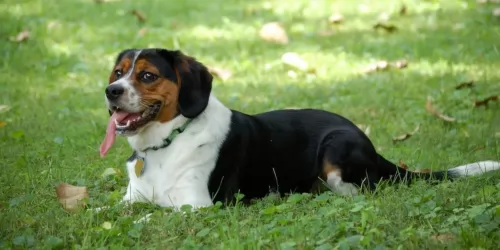 If you decide to bring a Beaglier to your family, it will be the best that you wait for your children to grow up a little bit. They are great to play buddy, but they get carried with the game and they can be very careless during the play. They fit perfectly with the children above the age of 5. They will run, jump, and do whatever your kid is about to do. They are friendly towards children they don’t know but they don’t do well with other animals they don’t know.
If you decide to bring a Beaglier to your family, it will be the best that you wait for your children to grow up a little bit. They are great to play buddy, but they get carried with the game and they can be very careless during the play. They fit perfectly with the children above the age of 5. They will run, jump, and do whatever your kid is about to do. They are friendly towards children they don’t know but they don’t do well with other animals they don’t know.
watchdog
One the main reasons why Beagliers are so much popular lay in their adaptability to any living conditions. They will fit in instantly in a family with children, but they will be happy as well if they live with just one person or even seniors. They can live indoors, houses and apartments without the yard. The Beaglier will enjoy the city parks, dog parks, beach, walking down the crowded streets. This breed is a not a quiet one – they will bark every time they notice something just to let you know. But, they are not aggressive type and they usually bark to communicate with people.
Usually, they are trained very easy. They have a stubborn nature, and if you learn how to get over with this temperament, you will be able to train and raise the sweetest dog ever. They should be trained and socialized while they are still puppies. Since they like too much, the best advice is to use treats to teach them everything that they will need to know. But, be careful with the feeding after the treats – Beagliers get easily obese if they are overfed.
 Contrary to his formidable looks, the Bullmastiff is a gentle, affectionate pet when he has been properly socialized. He is a great pet for families and will guard them with his life. He is loyal and devoted but can be somewhat aloof, particularly with strangers.
Contrary to his formidable looks, the Bullmastiff is a gentle, affectionate pet when he has been properly socialized. He is a great pet for families and will guard them with his life. He is loyal and devoted but can be somewhat aloof, particularly with strangers.
He isn’t a highly energetic dog and he is more or less low maintenance and easy-going. Feed him correctly, give him a nice, warm sleeping spot to call his own and give him attention like he deserves as a family member. The Bullmastiff will reward you by being a solid and devoted companion.
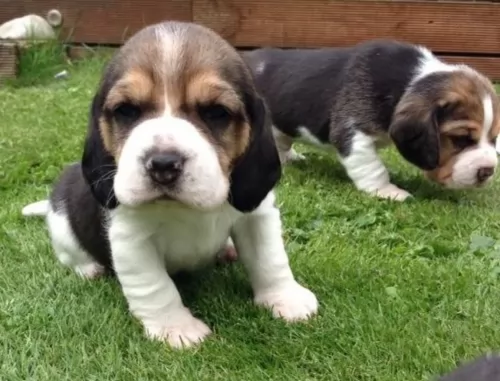 The Beaglier flap ears can be a very great place for the fungi, bacteria and dirt. You will have to clean their ears with an ear cleaning solution and a soft tissue once a week, especially if your pet is playing outside.
The Beaglier flap ears can be a very great place for the fungi, bacteria and dirt. You will have to clean their ears with an ear cleaning solution and a soft tissue once a week, especially if your pet is playing outside.
Cherry eye: Starts as redness in the corner of the eye. Happens when the third eyelid gland slips out of its place and show up as a red blob in the corner of the eye. Sometimes, the gland gets back to its original place in a couple of days, but it will be the best if you can take your dog to the vet as soon as you notice any readiness in his eyes.
Glaucoma: Happens because of the high eye pressure. This affects the normal outflow of the eye fluids and can cause blindness if not treated. It is the best to for your beagle to regular eye checks since this condition is not easy to diagnose in the begging.
 The Bullmastiff is a generally healthy breed, but even so, the breed is known for having to contend with certain health issues. He doesn’t have a particularly long life span either and can live to be about 10, ll or 12 years of age. Some of the more common illnesses to look out for include -
The Bullmastiff is a generally healthy breed, but even so, the breed is known for having to contend with certain health issues. He doesn’t have a particularly long life span either and can live to be about 10, ll or 12 years of age. Some of the more common illnesses to look out for include -
This is a condition where the thighbone doesn’t fit properly into the hip joint. The troublesome part is that it can lead to arthritis, pain and lameness for your pet.
This is a worrisome, life-threatening condition for a dog, particularly for large, deep-chested dogs such as your Bullmastiff. Instead of feeding your Mastiff one large meal, it is recommended to feed him 2 smaller meals. Bloat occurs when the stomach is distended with gas or air and twists, restricting the normal return of blood to the heart.
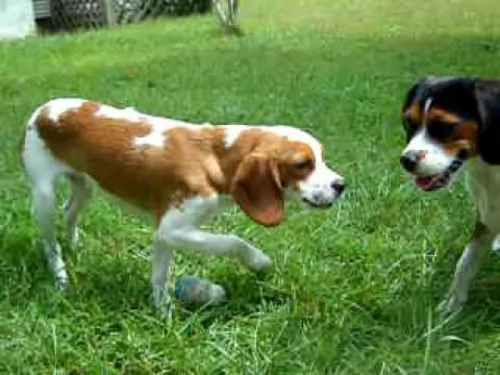 If you are not sure about the dog food you should give to your Beaglier considering the living environment and the lifestyle, it is always the best option to listen to the vet’s advice. They are prone to the obesity so you should keep a schedule that won’t be changed much. Feed them every day at the same time, no more than two meals per day once they get older than 6 months.
If you are not sure about the dog food you should give to your Beaglier considering the living environment and the lifestyle, it is always the best option to listen to the vet’s advice. They are prone to the obesity so you should keep a schedule that won’t be changed much. Feed them every day at the same time, no more than two meals per day once they get older than 6 months.
If you want your Beaglier to be happy, make sure you groom him daily. You will need about 5 minutes per day to brush him and keep him out of the tangles. Bathe then once in a month, that will be enough. Clip their nails regularly. Keep their ears cleaned.
They need a daily activity or they will get destructive. Be careful with the feeding since they get obese very quickly.
Since they are natural hunters, they will like to play chase. You can take them to the woods for a walk or for a run but make sure you train them to respond to your commands before you take them off the leash. They are very curious and they will easily wander off. They can be taught to play inside the house as well. They love to explore new areas so it will be great if you can take them with you for a holiday.
 The Bullmastiff has a short dense coat which is looked upon as low-maintenance. He will require a brushing twice a week, being a light to average shedder. He is a dog that tends to drool quite a bit so you may need to wipe away slobber from time to time. Because his face has wrinkles, check the creases to ensure they remain free of dirt and food particles to ward off infection.
The Bullmastiff has a short dense coat which is looked upon as low-maintenance. He will require a brushing twice a week, being a light to average shedder. He is a dog that tends to drool quite a bit so you may need to wipe away slobber from time to time. Because his face has wrinkles, check the creases to ensure they remain free of dirt and food particles to ward off infection.
Check his ears at the same time, brush his teeth at least twice a week with special dog-toothpaste and brush and keep the nails trimmed.
Your large Bullmastiff will require high-quality commercial dog food but he will also need some home-made food in between such as rice, vegetables and meat. He is a large dog and will have to get an intake of raw meat too. Dogs denied raw meat can end up with skin problems as well as other health issues.It is better to feel your Bullmastiff smaller meals than to give him one large meal which he scoffs down quickly. Smaller meals will help prevent the most dangerous illness known as Bloat.
Ensure he has a steady supply of fresh, cool water.